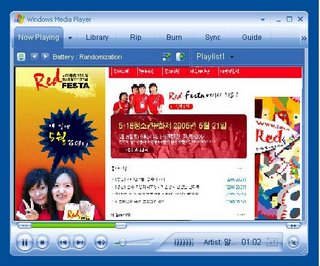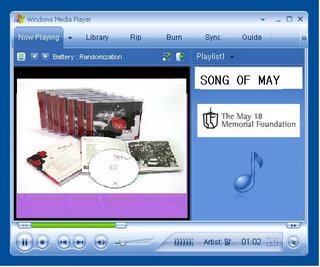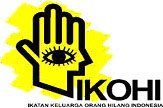
This is the internet ad for Red Festa 2006. Click the link below to watch the pix gallery of Red Festa 2005 (http://www.518red.net/html/photoContent.asp?seq=682 click the leftmost button 이전글 in Korean to scroll).
Click to watch video or cut and paste: http://www.518.org/file/mv/red.wmv
This video is a documentary of Red Festa 2005 commemorating and celebrating the heroic deeds of the people of Gwangju in the May 18, 1980 Gwangju Democratic Uprising. The language is in Korean.
Visit: http://www.518red.net (sorry but available in Korean language only)

Thursday, March 16, 2006
Red Festa Video and Pix Gallery
Wednesday, March 15, 2006
Song of May: Nostalgia and Euphoria of May 1980

Click to listen to Song of May, the music is in Korean. These are songs about the May 18 Gwangju Democratic Uprising.
Song of May: Nostalgia and Euphoria of May 1980
After the incident of May 1980, we have crossed a bridge where we cannot go back. So many people were massacred by the militarists that disguised themselves with democracy and justice, and there is no one who won’t feel guilty in front of those corpses. In an era where we had to fight in order to survive, our agitation had no choice but the revolution for a fundamental transformation defying any romantic feelings.
Going beyond grief, so many songs came out that became weapons for the struggle and overcame the darkness of that era. Also, with the effort of those who lived passionately with music, we now enjoy music as music itself. After 26 years, we produced this album to commemorate the May 18 Gwangju Democratic Uprising in order to remember and immortalize that fateful incident.
If it weren’t for those songs of gruesome deaths and the steadfast for hope, we might not have the sense of pride talking bout May 18 like we do now. Knowing the values of those songs that were alive from that era, we wanted to include all of them to this new album. However, we only selected 13 songs for realistic reasons. These are songs that contain the grief and rage of May 18. Reminiscent songs that have been written after the event are also included making this a great collection music album. We made effort to have it as a representative of various genres for your listening pleasure. For musicians who remember May 18, it is certainly necessary for us to make this album delivers not only a clear message but also to make it as high quality music as well.
The first song “Song of May – 3” is a powerful song that interprets the 5.18 as the hope of a huge history. It is quite easy to feel the solid harmony of the drums and piano, performed by the group “Salm, Treut, Sori”. Even if a Magnolia Sheds” boasts its extraordinary lyricism which likens magnolia to sadness of the May 18 incident, sung well by Jin-oh Moon’s delicate vocals. Joo-sun Choo’s song “Gwangju Brook” is a song which shows the lonely sorrow and resentment through a quiet cello, making the listeners dazed by bringing them back to the day May 18, 1980. The “Song of May -2” represents the May 18 incident, and it is re-arranged into a rock version, delivering the rage livelier than ever. Byung-hwee Sohn’s “The Story of May” is a song that throws a gentle wave through an arrangement of a simple guitar and ocarina. It makes us feel a great impression, but as we hear Chi-hwan An and Tae-choon Jung’s passionate voice, it reminds us of the unfinished task of the 5.18. The “Song of May 1”, was arranged in the hymnal-style that appeases to our wound serenely, while “Huckleberry Finn’s” rock version “March For Thou” enthuses us to follow them.
Although the song has the musical language of 2006, it goes beyond and captures the essence of May 18, 26 years after. The late Mr. Nam-ju Kim’s poem recitation “Massacre”, like a hammer pounding, is one of the greatest poems about the 5.18 which still offers a very moving and powerful impression. Ggotdaji’s “Advancing May” is played with actual sounds from the scene, and is just the right song for a requiem. “Oh Gwangju O Moodeungsan” is a hymnal-arranged piece that enables us to embrace a great peal of the 5.18 spirit that has been restored with magnificence. “Mwetbinari” is a Korean traditional style song that has been arranged with a theme of “March for Thou”. With its flowing and intense composition, it adorns the finale of the album excellently.
This album is filled with nostalgia of restoring the scenes at that time and the euphoria of reinterpreting those scenes as viewed today. For musicians who remember it, the 5.18 is a powerful event that made them who they are today, and it will be continually viewed as move towards progress.
This great album that had overcome different challenging situations was finally published through collaborative effort and passions of all those who helped with the work. We would like to thank all the musicians who helped directly and indirectly. Also, we hope that the song collections serve as a medium to keep the ideals and values of 5.18. This is the courtesy we can give to those who gave their own lives in order to defend democracy to the last that we now enjoy.
(Edited from the review: Publishing the 5.18 People’s Uprising Memorial Album of Min-Gaph Se Jeong, a popular music reviewer.)
Thursday, March 09, 2006
ACT NOW! Gwangju Prize for Human Rights Award 2006

The Gwangju Prize for Human Rights was established to celebrate the spirit of May 18 Gwangju Uprising by recognizing both individuals, groups or institutions in Korea and abroad that have contributed in promoting and advancing human rights, democracy and peace in their work. The prize is awarded by the citizens of Gwangju in the spirit of solidarity and gratitude from those whom they have received help in their struggle for democratization. It is hoped that through this award the spirit and message of May 18 will be immortalized in the hearts and mind of humankind.
The Gwangju Prize for Human Rights which is given yearly has the following aims:
1). To enhance the spirit of the May 18 Democratic Uprising by awarding individuals, groups or institutions in Korea and abroad on their contribution to improving human rights and peace throughout the world.
2). To reward individuals, groups and institutions in Korea and/or abroad for promoting the goals of the May 18 Democratic Uprising as a movement toward unification and cooperation.
A prize money amounting to US$ 50,000, a gold medal and a certificate will be awarded to the winner.
Previous Winners of the Gwangju Prize for Human Rights:
2000 (3rd Nov) : Xanana Gusmao (The president of East Timor)
2001 (18th May): Basil Fernando (Executive director of AHRC; Hong Kong)
2002 (18th May): Korean Association of Bereaved Families for Democracy; South Korea
2003 (18th May): Dandeniya Gamage Jayanthi (Monument for the Disappeared; Sri Lanka)
2004 (18th May): Aung San Suu Kyi (National League for Democracy; Burma)
2005 (18th May): Wardah Hafidz (Coordinator, Urban Poor Consortium; Indonesia)
Nomination and Criteria
The candidates eligible for the Gwangju Prize for Human Rights are nominations made by individuals or organizations who were invited to nominate names for consideration. An individual can not nominate himself or herself. These core criteria should be considered:
1). Outstanding person or group that is active in the promotion and advocacy of Peace, Democracy and Human Rights.
2). A person or group that works for the reunification of Korea.
The Gwangju Prize for Human Rights Committee
Gwangju Prize for Human Rights Committee is responsible for the selection of the candidates and the choice of prize winner. The Committee is composed of individuals appointed by the Board of the May 18 Memorial Foundation.
Information about the nominations, whether publicly or privately is confidential. Disclosure is highly restricted.
Timeline and Process
1). January-February
Announcement and nomination forms are sent out. The Committee sends out invitation letters containing forms to persons who will be requested to nominate.
2). 30 March 2006
Deadline for submission of the forms. The Committee assesses the candidates' work and prepares a short list.
3). April
The “shortlist” is reviewed by the committee and advisers will be consulted for their input and knowledge of chosen candidates. The advisers do not directly evaluate nominations nor give explicit recommendations. On April 27, 2006, committee members will choose a winner and the next day public announcement and press conference will be held in Seoul to announce the winner.
4). 18 May 2006
The Gwangju Prize for Human Rights Award Ceremony will be held. The prize winner receives the award.
________________________
Frequently Asked Questions
Gwangju Prize for Human Rights 2006
What is the Gwangju Prize for Human Rights?
The Gwangju Prize for Human Rights was established by The May 18 Memorial Foundation to celebrate the spirit of May 18 Gwangju Uprising. It is awarded as recognition both to individuals and groups or institutions in Korea and abroad that have contributed in promoting and advancing human rights, democracy and peace in their work. The prize is awarded by citizens the Gwangju in the spirit of solidarity and gratitude from those whom they have received help in their struggle for democratization and search for truth. It is hoped that through this award the spirit and message of May 18 will be immortalized in the hearts and mind of humankind.
What are the aims of the Gwangju Prize for Human Rights?
The Gwangju Prize for Human Rights is given yearly and has the following aims: 1) to enhance the spirit of the May 18 Democratic Uprising by awarding individuals, groups or institutions in Korea and abroad on their contribution to improving human rights, democracy, and peace throughout the world. 2) to reward individuals, groups and institutions in Korea and/or abroad for promoting the goals of the May 18 Democratic Uprising as a movement toward unification and cooperation.
How can I nominate someone for the Gwangju Prize for Human Rights?
The candidates eligible for the Gwangju Prize for Human Rights are those nominated by qualified persons or organizations. The nominee must be an outstanding person or group that is active in the promotion and advocacy of Peace, Democracy and Human Rights, and a person or group that works for the reunification of Korea. The nomination form is available online in the English section of www.518.org website.
Is it possible to nominate, myself or my organization and someone for a posthumous Gwangju Prize for Human Rights?
No, it is not possible to nominate yourself or your organization, also, posthumous nomination is not allowed either.
What is the process of nomination?
The nominator should accomplish the requirements found in the nomination form, get two other referees to answer the questionnaire, and submit by post the accomplished forms and the relevant documents to The May 18 Memorial Foundation.
When and where to submit the nomination?
All nominations must be sent by post to The May 18 Memorial Foundation not later than March 30, 2006.
Nominations should be mailed to:
The May 18 Memorial Foundation
c/o Gwangju Prize for Human Rights 2006
518 Memorial Culture Hall
Postcode 502-260
Seo-gu, Sangmudong 1268,
Gwangju City, Republic of Korea
Who will decide the winner for Gwangju Prize for Human Rights?
The Gwangju Prize for Human Rights Committee is responsible for the selection of the candidates and the choice of prize winner. The Committee is composed of individuals appointed by the Board of the May 18 Memorial Foundation. Information about the nominations, whether publicly or privately is confidential. Disclosure is highly restricted.
When will the winner be announced?
The winner will be announced on 28 April 2006 in a press conference that will be held in Seoul.
How many winners have been awarded the prize?
Since 2000, five individuals and 1 organization have been awarded the Gwangju Prize for Human Rights.
What is awarded to the winner?
Prize money amounting to US$ 50,000, a gold medal and a certificate is awarded to a winner.
When and where will the Gwangju Prize for Human Rights ceremonies take place this year?
The Gwangju Prize for Human Rights ceremonies will be held at the Gwangju City Hall, Gwangju City, South Korea on 18 May 2006. Republic of Korea.
For more information please send email to:
surnadal@hanmail.com (Chanho Kim)
mwalad@gmail.com (Mus)
518org@gmail.com
Visit our website: www.518.org
World Cultural Artist Meeting
World Cultural Artist Meeting
Video sent by Mustawalad
The video was taken by Mus and uploaded it, I enjoyed dancing with a participant from the Literary Group who had their conference simultaneous with the Forum we held. The event was in line with the ground breaking of the Asian Culture Center in Gwangju City, ROK.
Sunday, March 05, 2006
The May 18 Memorial Foundation
The May 18 Memorial Foundation
Video sent by peterahon


























